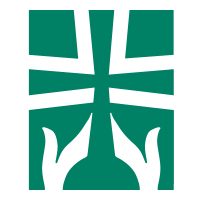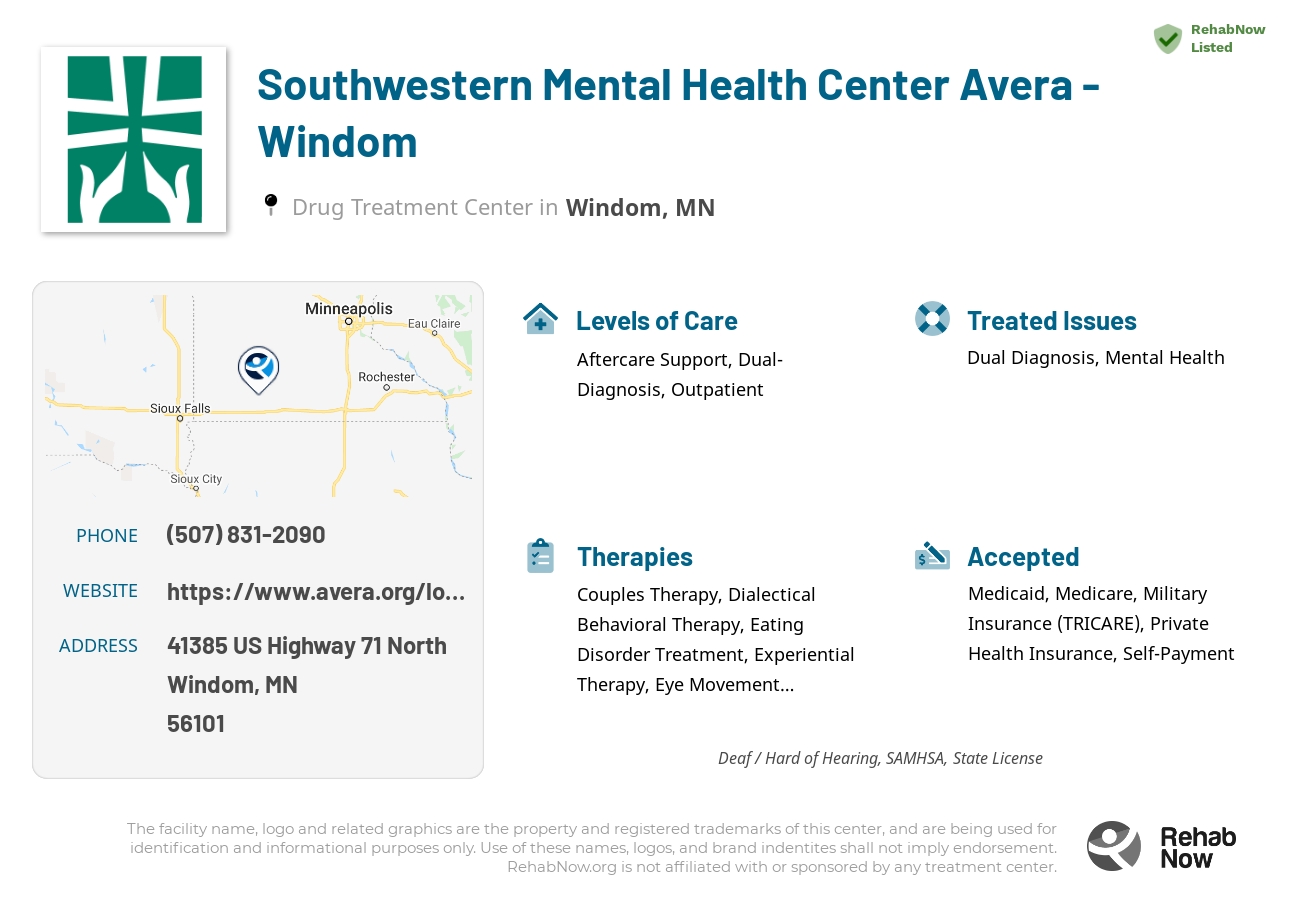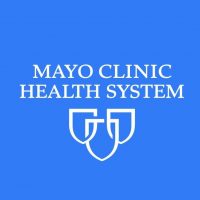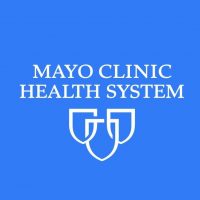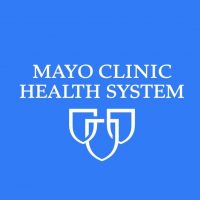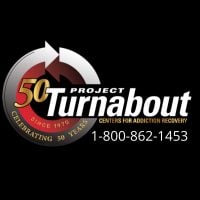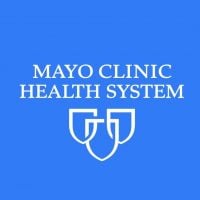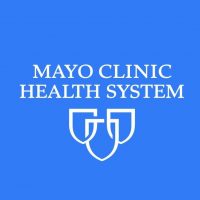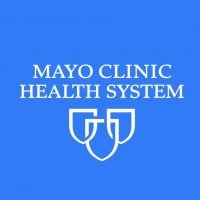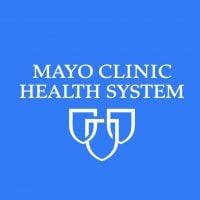Southwestern Mental Health Center Avera - Windom
Drug Rehab Center in Windom, Minnesota
Southwestern Mental Health Center Avera - Windom is an addiction treatment facility in Windom, MN, offering comprehensive care to individuals struggling with substance abuse, dual diagnosis, eating disorders, and mental health conditions, with aftercare support, dual-diagnosis treatment, and outpatient levels of care.
About This Minnesota Facility
Located in Windom, Minnesota, Southwestern Mental Health Center Avera specializes in behavioral health services for a broad age range, including children, adolescents, adults, and the elderly. This center stands out for its comprehensive approach to substance abuse treatment, emphasizing respect, dignity, and family involvement in the recovery process.
- Individualized Treatment Plans: Tailored care to meet each patient's unique needs for a more effective recovery.
- Comprehensive Support Services: Offers family sessions, support groups, and education, ensuring a holistic approach to rehabilitation.
- Hazelden Betty Ford Patient Care Network Membership: Ensures access to high-quality resources and support for patients.
Southwestern Mental Health Center Avera holds prestigious accreditations from JCAHO and SAMHSA, and maintains a valid state license, underscoring its commitment to providing exceptional care. The center's affiliation with Avera Health allows for a wide range of specialized services and access to a network of professionals.
The center addresses various addictions, including opioid addiction, alcoholism, and drug abuse, employing methods like pain management and relapse prevention. With outpatient, inpatient, detox, and partial-hospitalization services, patients receive tailored treatment to support their journey to sobriety.
Genders
Ages
Modality
Additional
Accreditations
State License
SAMHSA

JCAHO
Conditions and Issues Treated
When addiction and psychiatric issues co-occur, the addict’s recovery is more successful when both conditions are treated. A dual diagnosis refers to a condition in which the patient is diagnosed with two health issues: addiction and bipolar disorder.
Usually, dual diagnosis sufferers are prescribed a combination of treatments for each condition. The most common therapies are psychotherapy, behavioral therapy, spiritual counseling, 12-step programs, and medication management.
Psychiatric conditions are an obstacle to recovery because they can create roadblocks to a healthy lifestyle. Drugs and alcohol may be used as a means of self-medication, which can have dangerous consequences. Over time, addicts build up a tolerance and suffer withdrawal symptoms when drug use is stopped.
With the proper treatment, dual diagnosis sufferers can overcome their conditions and achieve lasting sobriety.
Levels of Care Offered at Southwestern Mental Health Center Avera - Windom
This center offers a variety of custom treatment tailored to individual recovery. Currently available are Aftercare Support, Dual-Diagnosis, Outpatient, with additional therapies available as listed below.
Individuals struggling with drug addictions can get help from several treatment options, including inpatient and outpatient programs. Outpatient drug treatment programs can also provide patients with different levels of care, usually depending on the patient’s degree of addiction.
At an outpatient program in Windom, a patient will attend a recovery program during the day and return home in the evening. Suppose a patient is struggling with drug addiction. In that case, an outpatient program can serve as an effective transition point during the recovery process.
Aftercare is a part of drug rehabilitation. It is also known as “post-treatment support.” Aftercare programs are available for addicts after they complete drug rehab. It is often the final step in the recovery process. The goal of aftercare is to ensure that addicts maintain their achievements in rehab and do not relapse. Professionals generally provide aftercare (including addiction therapists, physicians, social workers, psychologists) and involve individual and group therapy sessions.
Therapies & Programs
Individual therapy is a critical component of addiction recovery. It allows the patients to go deep into their core issues and discover how to handle those problems better. Therapy can be conducted in individual sessions as well as group settings. In individual therapy for addiction, the patient meets with their therapist one-on-one to focus on the underlying issues. This allows patients to open up and discuss personal topics they may not feel comfortable discussing in a group setting. This type of therapy can help develop solutions specific to each patient, which helps speed up the recovery process.
Couples therapy is beneficial for couples in which at least one partner has a substance use disorder. This type of therapy can help partners improve communication skills, which is an important factor in a healthy relationship. It can also help partners better understand one another so they have a greater understanding of how the other partner may be feeling.
Benefits of couples therapy include:
- Improvement in communication skills
- Increased understanding of the dynamics within a relationship
- Increased sense of support and trust in the relationship
- Better teamwork between partners/increased willingness to listen and work together
- Enhanced tolerance of each other’s shortcomings
- Improved ability to have open, honest communication with each other
Family therapy is a crucial part of drug treatment and getting sober. It is one of the most effective ways to help addicts stay on the path to long-term sobriety. When a drug addict decides that they want to try and get sober, it takes the support of every person they love to succeed. It can be incredibly difficult for loved ones to watch an addict go through the pain and suffering of withdrawal, but by being there with them and supporting them, they can help to make sure that the addiction never returns.
One of the most important parts of family therapy is the relapse prevention plan. During treatment, therapists and doctors will often sit down with the addict and their family to develop a plan in case the addict ever feels like they want to use again. This plan should involve steps the addict and family can take together to prevent them from relapsing in the future. An addict’s family can play a vital part in helping them to avoid relapse because they can spot the warning signs and help them get back on track before it becomes too much of a problem.
Group therapy helps prevent addicts from feeling isolated or unique in their situation by offering a sense of comfort and fellowship. It also creates a forum for addicts to build their support systems and learn from each other. The group therapy sessions at Southwestern Mental Health Center Avera - Windom occur in a group setting rather than one-on-one to create a safer, controlled environment where addicts feel comfortable.
Trauma therapy helps people dealing with addiction by allowing them to confront the traumas of their past and move past them. It is important to note that trauma therapy should not be confused with PTSD (post-traumatic stress disorder) Rather, it is used to treat the effects of trauma, which are often at the root of addiction.
Dialectical Behavior Therapy was developed in the 1980s to treat chronically suicidal individuals. It is a cognitive-behavioral therapy that combines strategies derived from Zen Buddhism, such as mindfulness training. DBT has been adapted for use with other types of psychiatric problems, including substance abuse and personality disorders. DBT aims to help patients change their thinking and behavior, instead of relying on medication.
Cognitive Behavioral Therapy (CBT) is a common therapeutic approach to help drug addicts. It teaches addicts new ways of thinking and behaving so that they can avoid relapse. There are several forms of CBT used in drug rehabilitation centers.
Cognitive Restructuring helps addicts identify faulty, negative thinking so that they can work together with the therapist to find healthier ways of thinking, resulting in better decision-making.
Cognitive Behavioral Therapy for Addiction uses the principles of CBT to help treat addiction. It focuses on specific aspects of each person’s thinking, feeling, physiology, and behavior. It aims to identify specific problems in these areas and create a personalized treatment strategy.
Eye movement desensitization and reprocessing is a form of psychotherapy that allows individuals to heal from the emotional distress that is the result of disturbing life experiences. It uses alternating bilateral stimulation the therapeutic process where the patient moves his/her eyes back and forth while recalling distressing thoughts or feelings can be facilitated by this eye-movement technique.
- It is effective to treat a range of different problems such as: anxiety, depression and grief.
- short term therapy (8-16 sessions) and normally 10 sessions is maximum treatment time required for treating emotional problems.
- has been found to be as helpful as cognitive behavioural therapy or exposure therapy.
Patient Experience
Experiential Therapy at Southwestern Mental Health Center Avera - Windom
Experiential Therapy is a new approach to addiction treatment. Addiction-related psychological issues like depression and anxiety are addressed through physical activities.
Experiential Therapy can help those who have struggled with past traumas or life decisions like drug use. It allows people to gain new perspectives on their behavior patterns by recreating experiences in healthy ways rather than continuing old habits that may no longer serve them well.
Payment Options Accepted
For specific insurance or payment methods please contact us.
Is your insurance accepted?
Ask an expert, call (888) 674-0062
Avera Health Associated Centers
Discover treatment facilities under the same provider.
- Southwestern Mental Health Center Avera - Worthington in Worthington, MN
- Access Family Medical Clinic & Avera Medical Group in Worthington, MN
- Southwestern Mental Health Center Avera - Luverne in Luverne, MN
- Southwestern Mental Health Center Avera - Worthington in Worthington, MN
- Allina Health Outpatient Addiction Services in Minneapolis, MN
Learn More About Avera Health Centers
Additional Details
Specifics, location, and helpful extra information.
Windom, Minnesota 56101 Phone Number(507) 831-2090 Meta DetailsUpdated April 15, 2024
Staff Verified
Patient Reviews
There are no reviews yet. Be the first one to write one.
Windom, Minnesota Addiction Information
Minnesota is fighting an opioid epidemic that is leaving hundreds of its residents dead each year. Both prescription opioids and illicit opioids are widely abused in the Land of 10,000 Lakes. Heroin continues to be one of the most commonly abused drugs in the state, if not the most common illicit drug. Over 10% of all treatment admissions in Minnesota list heroin as their drug of choice.
Treatment in Nearby Cities
- Osseo, MN (120.3 mi.)
- Scandia, MN (148.2 mi.)
- Perham, MN (188.7 mi.)
- Ely, MN (318.9 mi.)
- Alexandria, MN (138.8 mi.)
Centers near Southwestern Mental Health Center Avera - Windom
The facility name, logo and brand are the property and registered trademarks of Southwestern Mental Health Center Avera - Windom, and are being used for identification and informational purposes only. Use of these names, logos and brands shall not imply endorsement. RehabNow.org is not affiliated with or sponsored by Southwestern Mental Health Center Avera - Windom.
